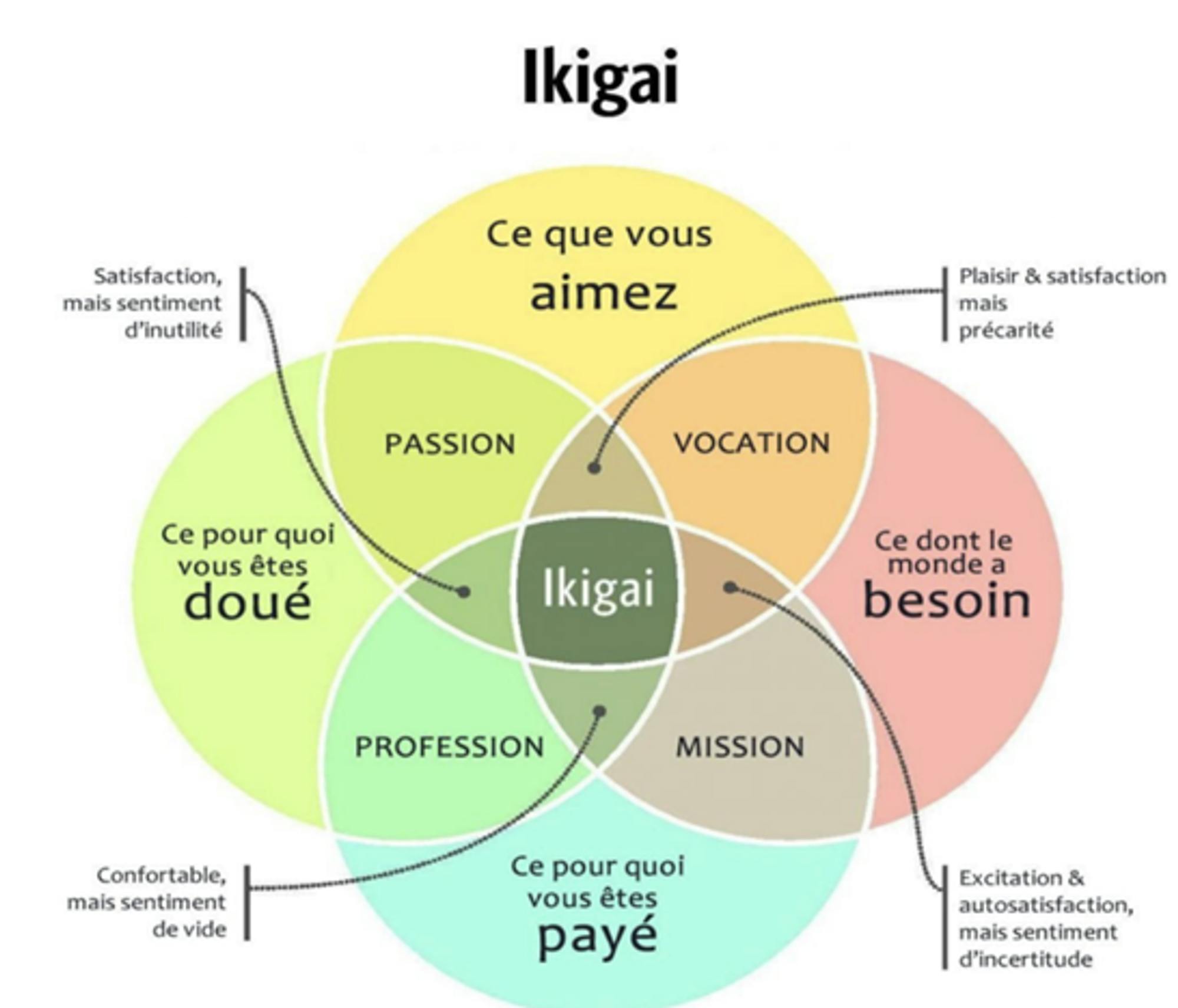Work Tips
How to find your Ikigai - Method and advice

Wiggli Team
July 31, 2024

Everyone dreams of a professional activity that is both meaningful and keeps a roof over your head. This ideal has a name - Ikigai. The method comes to us from Japan and promises to enlighten us about our “raison d’être” or purpose in life.
So what exactly is Ikigai? How does it work? Here is some advice you can put into practice to find your purpose.
Ikigai is a 14th century Japanese method
Ikigai is a philosophy of life practised by the inhabitants of the Okinawa archipelago in southern Japan. It has become famous because of the exceptional longevity of the people who live there. Nicknamed “the Island of Centenarians”, Okinawa has the highest population of healthy senior citizens in the world.
Studies that have looked closely at the lifestyles of these Japanese people have identified several contributing factors, including a healthy diet, daily physical activity and Ikigai. This state of mind translates into a purpose or mission in life, a form of joy that makes you want to get out of bed in the morning.
To find your Ikigai is to find your purpose in life.
In her book “Finding your Ikigai”, Christie Vanbremeersch explains that the Ikigai Method is for anyone who wonders about the meaning of their life and their deeds, ****and who wants to lay a solid foundation for their professional future, regardless of age. It can be used when you have lost your motivation and are trying to bring fresh meaning to your work. It can also be part of a vocational retraining project.
So how do we go about it? First and foremost, the author and professional coaches who use the Ikigai method recommend sincerity as the way to get the most out of this method. Then they ask you to do the following: draw 4 large circles as shown in the diagram below on a blank sheet of paper:

Source: Daily Geek Show
In the circle “What you like to do”, make a list of all the things that bring you pleasure and joy in your daily life. Ask yourself: what are your hobbies, your leisure activities? What activities do you do that you don’t notice the time going by? What topics are you interested in? What shows or podcasts do you watch or listen to?
In the “What you are good at” circle, jot down your abilities and talents. Think about the qualities you use in your personal and social life. For example, you may be known for your skills in listening, mediating, organising or mastering web development, cooking or education.
In the circle “What you are paid to do”, write down all your professional skills. What are your tasks? What know-how and skills do you make use of on a daily basis? What other skills would you deserve to get paid to use?
In the “What the world needs” circle, think about the causes that you are passionate about. What situations do you find unfair, what makes you angry? What fights do you feel are essential? Who would you like to help and why?
Once the exercise is complete, take a step back and observe your work. Look at each of the circles to see what seems superficial and what seems essential to you? Do any links appear between these different elements? Bridges? By finding a link between these essential elements, you will find your Ikigai.
Tips to follow to find your Ikigai
Tip No. 1: Patience and experimentation
The method may be easy for anyone to try, but you won’t find your Ikigai by simply snapping your fingers. Specialised coaches warn people who want to take this path: finding your Ikigai requires patience. It can take weeks, months or even years. In fact, the Japanese believe that finding your Ikigai too soon brings misfortune! In addition, it is something that evolves over the years in line with emerging careers and challenges in our Society, as well as in your life, your professional and personal experiences. That is why it is advisable to keep track of your work and to return to it from time to time to keep it up to date.
Then, to find your Ikigai, author Christie Vanbremeersch insists on the importance of experiencing the feeling of precariousness and impoverishment to find your path. This means that it is necessary to live poor experiences to appreciate the richness of Ikigai. Doing a job that you do not like but allows you to make a good living, doing a job you are passionate about without being well paid, and not finding meaning in your job are essential stages to reach Ikigai.
Tip No. 2: Ask for advice to realise your Ikigai
Ikigai is a work of introspection that requires good self-knowledge while maintaining an objective eye. We are influenced by many unconscious beliefs drawn from our education and experiences, and we can make harsh and erroneous judgements about ourselves. That is what makes this exercise complicated. So remember to call on the people around you: family, friends, co-workers, former managers… these people will be able to offer a neutral and fair appraisal of your skills, your talents and your attributes. To be even more efficient, ask them to illustrate their remarks with one or more concrete examples (especially those in your inner circle). This is a very good way to avoid thinking “they only say that because they love me!”
Tip No. 3: Accept guidance from an Ikigai coach
A professional coach is a guide who can help you find the answers to your questions, remove obstacles and limiting beliefs (an indispensable step) to identify your purpose in life. Through techniques such as questioning, reformulation and role playing, the coach supports you on your personal journey and career, making the process faster and more serene.
Tip No. 4: read books about Ikigai
If you don’t have the budget or don’t want to hire a coach, open a book! There are several books on Ikigai that detail the method and are full of inspiring testimonials:
- Trouver son Ikigai by Christie Vanbremeersch ;
- Ikigai - the Japanese Secret to a Long and Happy Life by Hector Garcia and Francesc Miralles;
- The Ikigai Journey: A Practical Guide to Finding Happiness and Purpose the Japanese Way by Hector Garcia and Francesc Miralles;
- Mettez votre Ikigaï au service de votre réussite professionnelle by Pierre Cocheteux.
To conclude, people who have found or are getting close to their Ikigai have one thing in common: they invested in themselves.









